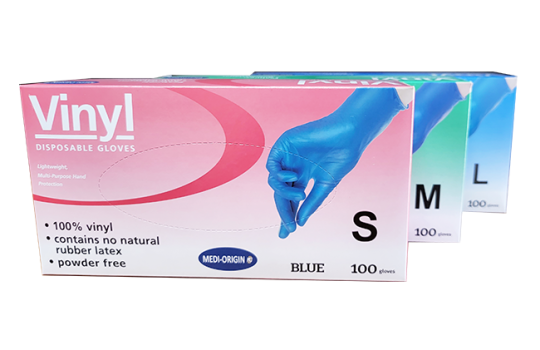What Are Vinyl Disposable Gloves
January 30, 2023 2023-01-30 2:40What Are Vinyl Disposable Gloves

What Are Vinyl Disposable Gloves
Vinyl gloves should be on everyone’s shopping list because they are cozy and soft. They are employed not only in kitchens all around the country but also in a number of occupations outside the culinary sector.
In terms of chemistry and appearance, vinyl gloves are comparable to latex gloves. However, vinyl gloves use synthetic compounds in place of natural latex to make the rubber-like substance that forms airtight and watertight barriers.
They are therefore excellent for shielding delicate skin from various chemicals, such as acids, solvents, and cleaning products.
How Do We Define Disposable Vinyl Gloves?
Disposable vinyl gloves are made from PVC, a film with a petroleum base. Disposable vinyl gloves’ main selling point is their low cost of production.
However, they are less resilient than latex and nitrile and provide only sporadic defense against chemical or biological exposure.
PVC, or polyvinyl chloride, is the generic name for the type of plastic used to make vinyl gloves. This substance is a synthetic (man-made) polymer utilized in a variety of products, including wire insulation, pipes, and medical equipment.
Disposable vinyl gloves are used frequently because they are reasonably priced and offer some level of skin protection for activities like gardening and handling chemicals. Vinyl gloves are the most affordable glove choice.
Although it may sound amazing, they don’t provide as much protection as latex or nitrile gloves. The individual molecules within vinyl gloves split from one another when they are stretched. As a result, the material becomes brittle and the gloves’ ability to protect your hands is diminished.
Apart from this, disposable vinyl gloves are still a reasonable choice in environments like kitchens and restaurants where a robust barrier of protection isn’t required.
The Benefits that Vinyl Disposable Gloves can bring to you
Vinyl gloves are superior in look, thin and lightweight like latex gloves, and much simpler to put on and take off than latex gloves. The following information will help you use them.
- Reasonable——Cheaper than nitrile and latex gloves, vinyl gloves are less robust and less puncture-resistant than their equivalents. Vinyl gloves are therefore ideal for tasks where prolonged usage of the gloves is not expected or when frequent glove replacement is necessary.
- Latex-free——Vinyl disposable gloves can be used in place of latex-containing gloves if you are allergic to latex. They don’t expose themselves to the allergy risks that come with natural rubber latex (NRL) gloves. These gloves come in various sizes and colors and are often less expensive than latex-made ones.
- Functionality——When performing low-risk activities like mixing colors or making sandwiches, vinyl gloves are suitable for use for a brief amount of time. They are also excellent for general-purpose operations like cooking, cleaning, and many other jobs that call for basic handling of commonplace items.
- Easy to put on and remove——Vinyl gloves are made to fit more loosely than other types of gloves, which makes them simple to put on and take off. Vinyl gloves are frequently a better option than other types of gloves if you need to rapidly put on and take off gloves.
- Security——Vinyl gloves can be worn in the workplace despite the possibility of latex allergy. Vinyl gloves are also synthetic and non-biodegradable, giving them a longer shelf life.
- Anti-static qualities ——When used by someone handling fragile, static-prone products, anti-static gloves help dissipate static charges. People who clean, check, and repair electronic equipment frequently use anti-static gloves. Vinyl gloves typically have a built-in anti-static property because they are made of insulating synthetic rubber.
Which Business Can Vinyl Disposable Gloves Be Used For?
In addition to the food business, medical environments, and the chemical, pharmaceutical, and home improvement industries all employ vinyl gloves. Some of their most typical applications include:
- Preparation of Food: When preparing non-greasy dishes, such as those that can be found in a hospital cafeteria or a restaurant kitchen, vinyl gloves that have been certified are safe to use. Vinyl gloves cannot be used with food that is greasy, fatty, or oily. The softening chemicals may seep out of the oils and into the food, making the glove brittle.
- Low-risk Job: Vinyl gloves are effective for quick, low-risk operations that may include contact with trace amounts of non-hazardous liquids and bodily fluids (such as when handling blood samples manually).
- Light-electrical Work: These gloves are especially helpful when handling cables and wires during light electrical work. These gloves shield hands from chafing since stripping back their sheaths with tools might produce static electricity.
- Painting and Printing: Vinyl gloves are the perfect hand protection for painting and printing. They are quick and simple to put on and take off, offer excellent coverage, and keep hands sanitized.
- Fundamental Cleaning Tasks: Vinyl gloves will function as a protective barrier for the majority of basic cleaning tasks, such as dusting or mopping, so long as you only use non-hazardous chemicals.
Latex Sensitivities and Vinyl Gloves
Those who have experienced contact dermatitis and have allergies to other substances are more likely to develop a latex allergy.
The signs and symptoms might be minor, severe, or even lethal. So how does it function? Natural rubber contains a protein that can trigger an allergic reaction, which causes the body to release chemicals including histamines.
When a person with an allergy is exposed to natural rubber, these compounds are released into the body. Direct skin contact or ingestion might result in exposure.
Make sure you get the proper kind of gloves if you want to prevent a latex allergy. Vinyl gloves can help prevent the allergic incidents.
Will Vinyl Disposable Gloves Induce Allergies?
Anyone experiencing an adverse response to vinyl gloves is quite rare. People who believe they have an allergy may instead be suffering from contact urticaria, a skin irritant brought on by inadequate ventilation in the glove.
Vinyl gloves are impermeable, thus after a while of use, they cause your hands to perspire. Heat and sweat cause moisture to condense within the glove. This makes the skin uncomfortable by causing it to become inflamed.
What is Contact Urticaria, then? The skin becomes inflamed when exposed to the chemical that has triggered the allergy, which is known as contact urticaria.
Exposure to a variety of substances can lead to it. The signs of contact urticaria typically disappear quickly. After the allergic reaction’s underlying cause is addressed, it often goes away within 24 hours.
It is brought on by the body’s response to the release of our own histamine into the skin. Every human body naturally produces histamine, which serves as a barrier against external bacteria and viruses.
Wear fabric liners that absorb moisture between your hands and the glove to keep them dry. They can either be included into the glove or worn inside the glove as a separate layer. The overall hand defense is thickened as a result, which limits finger dexterity and movement.
Not all allergic reactions to gloves are brought on by latex. Other chemical additives in the gloves can make a person wearing them have allergic responses or irritating contact dermatitis. Numerous compounds, such as carba mix, mercaptobenzothiazole (MBT), thiuram mix, mixed dialkyl thioureas, black rubber mix, and petroleum, can be found in vinyl gloves.
Leakage is another possible response type. Disposable gloves can leak or tear if you keep them on for too long, exposing you to chemicals, irritants, and other dangerous substances.
Your chances of having an allergic response are low if you use vinyl gloves carefully.
Summary
Vinyl gloves are ideal for a wide range of industries. These gloves are comfortable to wear, inexpensive, and excellent for guarding against non-hazardous chemicals.
But it all comes down to what you need. There are many more styles of gloves available if vinyl gloves don’t meet your requirements. But vinyl might be your best option if you’re searching for a disposable option that offers decent value.





